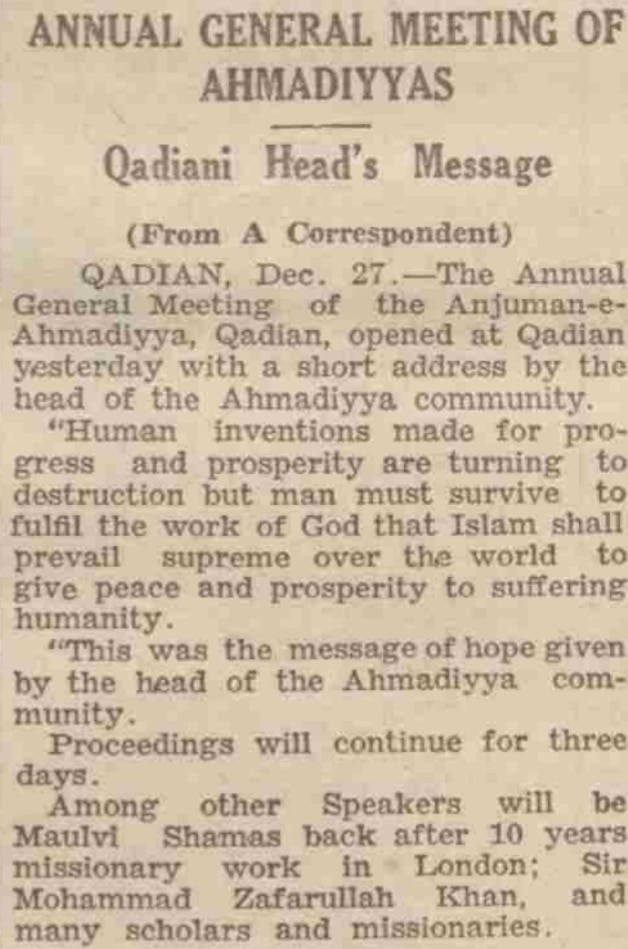Ata-ul-Haye Nasir, Ahmadiyya Archive and Research Centre
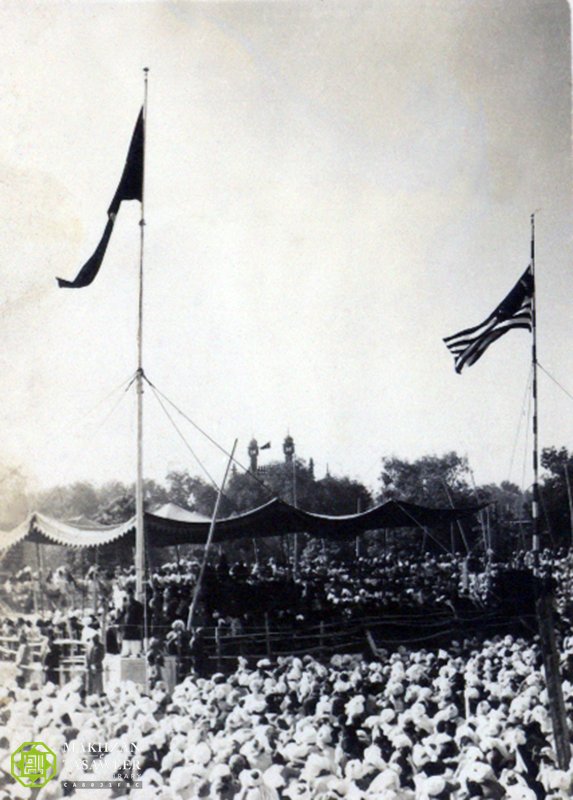
Jalsa Salana is a blessed institution that was founded by the Promised Messiah and Mahdi, Hazrat Mirza Ghulam Ahmadas of Qadian, to help his Jamaat achieve those heavenly objectives for which he was sent by Allah the Almighty.
Thus, in 1891, two years after the foundation of the Ahmadiyya Muslim Jamaat, the first Jalsa Salana was held in Qadian which was attended by 75 individuals.
Ever since its initiation, the institution of Jalsa Salana has made great progress, by the grace of Allah, and expanded to an enormous level due to the blessings of Khilafat. It has proved immensely beneficial for the moral and spiritual edification and advancement of members of Jamaat-e-Ahmadiyya. Moreover, it plays a major role in highlighting the Jamaat’s identity on the global horizon and in the same way, it is a manifestation of the ever-growing progress of the Jamaat.
The Jalsa Salana which was initiated by the Promised Messiahas is still prospering and being held in all parts of the world under the blessed guidance of Hazrat Khalifatul Masihaa, and many of those Jalsa gatherings are blessed with his presence as well.
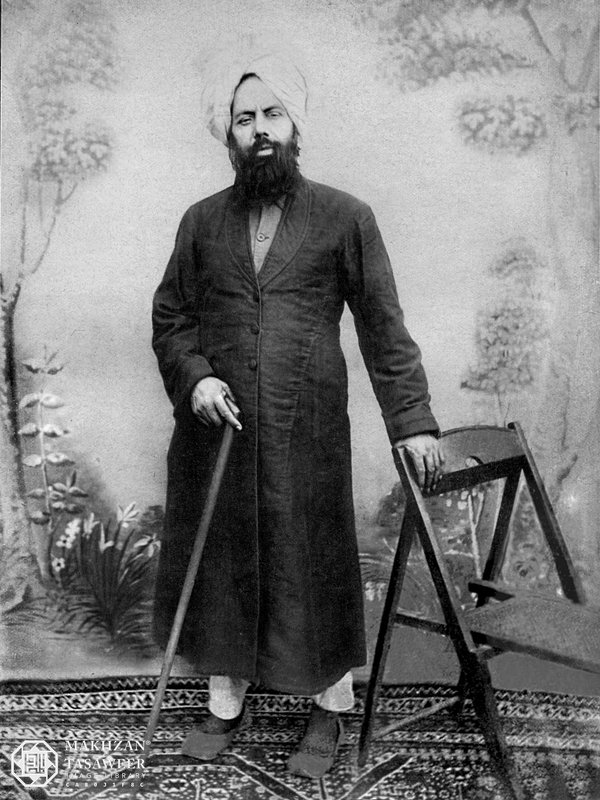
Below are some newspaper articles mentioning the history and importance of Jalsa Salana, summaries of Hazrat Khalifatul Masih’s addresses at the early jalsas of Qadian, and an introduction of Ahmadiyyat and its missionary activities.
Jalsa Salana 1925
Reporting on the Jalsa Salana Qadian 1925, The Civil and Military Gazette reported under the heading “Ahmadiyya Community: Proceedings at Qadian”:
“Qadian, Batala, Dec. 28.
“Today is the last sitting of the annual gathering of the Ahmadiya community. The number of visitors yesterday reached 12,000. Hazrat Khalifat-ul-Masih spoke for five hours. Among the speakers yesterday was Maulvi Abdul Rahim Nayyar[ra] of the London Lagos Mission, who thanked the Government for giving the Ahmadiya missionaries the same protection which the Christian missionaries enjoyed.
“The ladies’ conference, which has been attended by 3,000, has been a great success.” (The Civil and Military Gazette, 30 December 1925, p. 3)
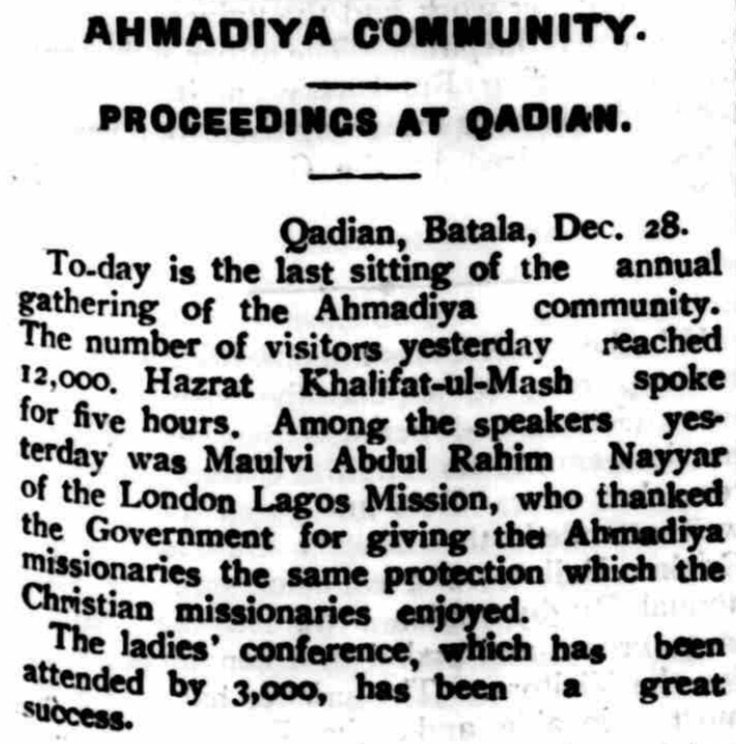
Jalsa Salana 1926
Reporting on the Jalsa Salana Qadian 1926, The Civil and Military Gazette reported under the heading “The Ahmadiyya Community: Annual Gathering at Qadian”:
“Qadian, Dec. 29.
“The annual gathering of the Ahmadiyya community opened its proceedings on December 26 and after three days’ work has closed. The small town of Qadian, away from a railway station, attracting about 16,000 visitors including 3,000 ladies.
“Hazrat Khalifat-ul-Masih[ra], head of the movement addressed the conference on December 27 and 28, denouncing the murder of Swami Shradanand.
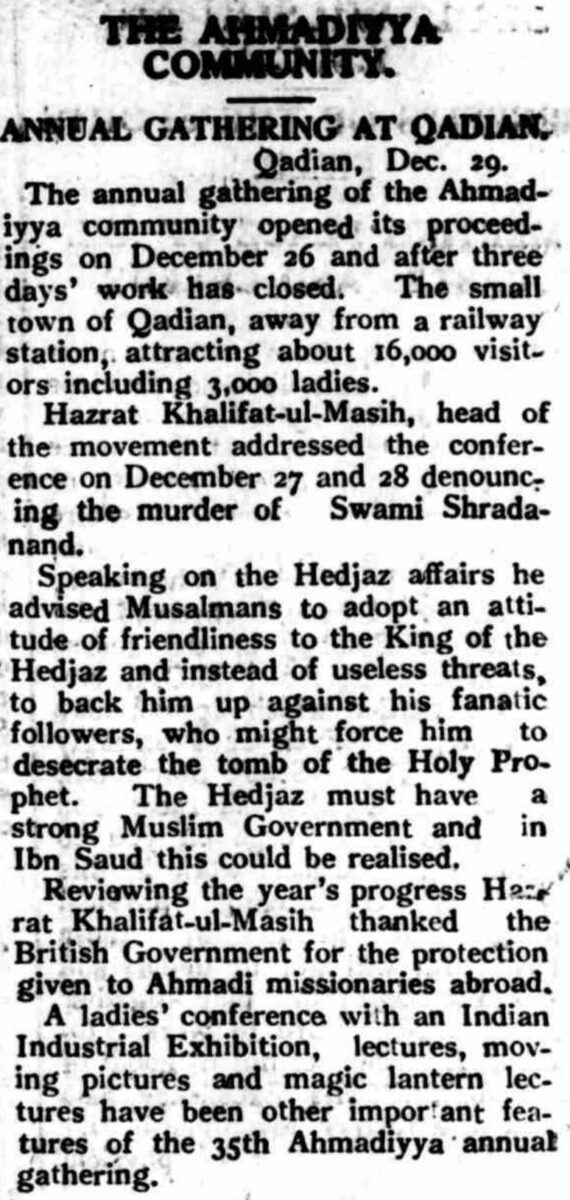
“Speaking on the Hedjaz affairs he advised Musalmans to adopt an attitude of friendliness to the King of the Hedjaz and instead of useless threats, to back him up against his fanatic followers, who might force him to desecrate the tomb of the Holy Prophet[sa]. The Hedjaz must have a strong Muslim Government. [….]
“Reviewing the year’s progress Hazrat Khalifat-ul-Masih[ra] thanked the British Government for the protection given to Ahmadi missionaries abroad.
“A ladies’ conference with an Indian Industrial Exhibition, lectures, moving pictures and magic lantern lectures have been other important features of the 35th Ahmadiyya annual gathering.” (The Civil and Military Gazette, 4 January 1927, p. 10)
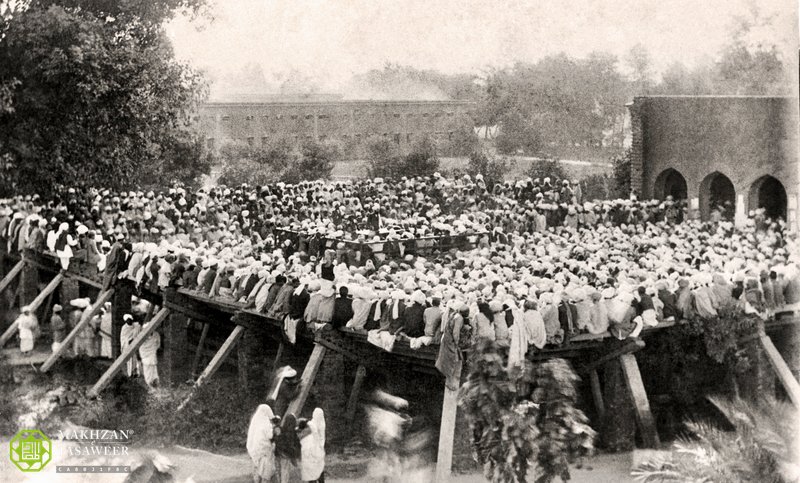
Jalsa Salana 1927
Reporting on the Jalsa Salana Qadian 1927, the same newspaper wrote:
“The proceedings of the 36th annual gathering of the Ahmadiyya Community were brought to a close on Thursday at Qadian.” (The Civil and Military Gazette, 1 January 1928, p. 4)

Jalsa Salana 1934
Mentioning the Jalsa Salana Qadian 1934, The Indian Express reported under the heading “Quadian Ahmadiyas to Meet: Annual Gathering at End of December”:
“The annual gathering of Ahmadiyas of Qadian, a community numbering over a million and with missions in England, America, Africa and near and far East will meet at Qadian, Punjab on the 26th, 27th and 28th Dec. and will be addressed among others by the head of the community Hazrat Mirza Bashiruddin Mahmud Ahmad[ra], Khalifatul Masih who is expected to make an important announcement regarding Ahmadiya policy in the light of recent developments following the recent Ahrar Conference at Qadian.
“About 20,000 including members outside the Qadiani community are expected to attend.
“Chaudhari Zafrullah Khan[ra], delegate to the Round Table Conference will deliver an address on socialism and the economic ideal of Islam and Ahmadiya missionaries who have returned from England and Russia will also address the gathering.—A.P.” (The Indian Express, 12 December 1934, p. 3)
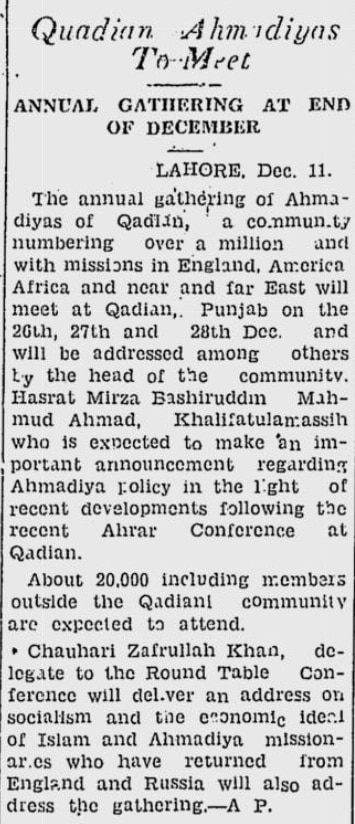
The Civil and Military Gazette wrote under the heading “Annual Gathering of Ahmadiyas”:
“Qadian, Dec. 26.
“The annual gathering of the Ahmadiyas opened here today when some 15,000 people from all parts of India were present, including Chaudhri Zafrullah Khan, Chaudhri Muhammad Din, Revenue Member, Jaipur State, Professor Abdul Majid of Bhagalpur and Seth Abdulla Alladin.
“The gathering was inaugurated by the head of the Ahmadiyas who welcomed the delegates and visitors. He referred to the rapid growth of the Ahmadiya movement from an insignificant beginning.—A.P.” (The Civil and Military Gazette, 27 December 1934, p. 7)
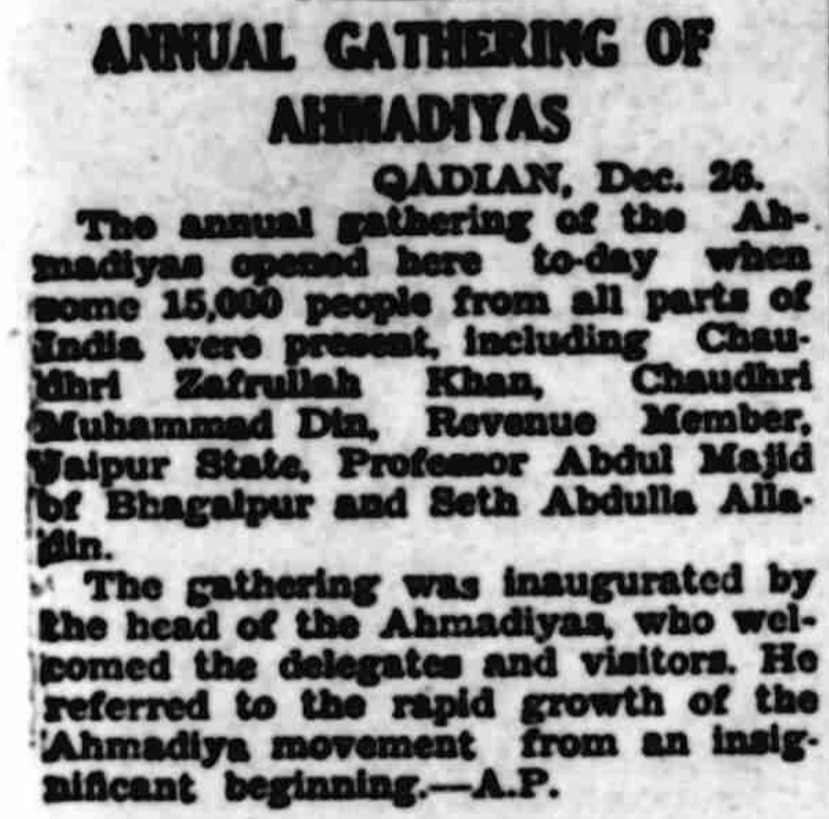
The same newspapers wrote on the next day, under the heading “Ahmadiya Movement Defended: Detractors Denounced”:
“Qadian, Dec. 27.
“Large numbers of people are here in connection with the annual gathering of the Ahmadiyas. Professor Aslam of Government College, Lahore, delivered an address on ‘God and Morals.’
“Before a huge audience and in a tense atmosphere of excitement the head of the Ahmadiyas strongly denounced the campaign of vilification of the Ahmadiya movement and its Founder which, he said, would have created riots but for the peaceful attitude of the Ahmadiyas. They would not seek revenge.
“He said that the Ahmadiyas were accused of blaspheming the Prophet [Muhammadsa] but, he declared, they loved the Prophet [Muhammadsa] and had done more than anyone to spread his teachings in Europe, America and Africa. Their organisation was based on righteousness and peace.” (The Civil and Military Gazette, 28 December 1934, p. 5)
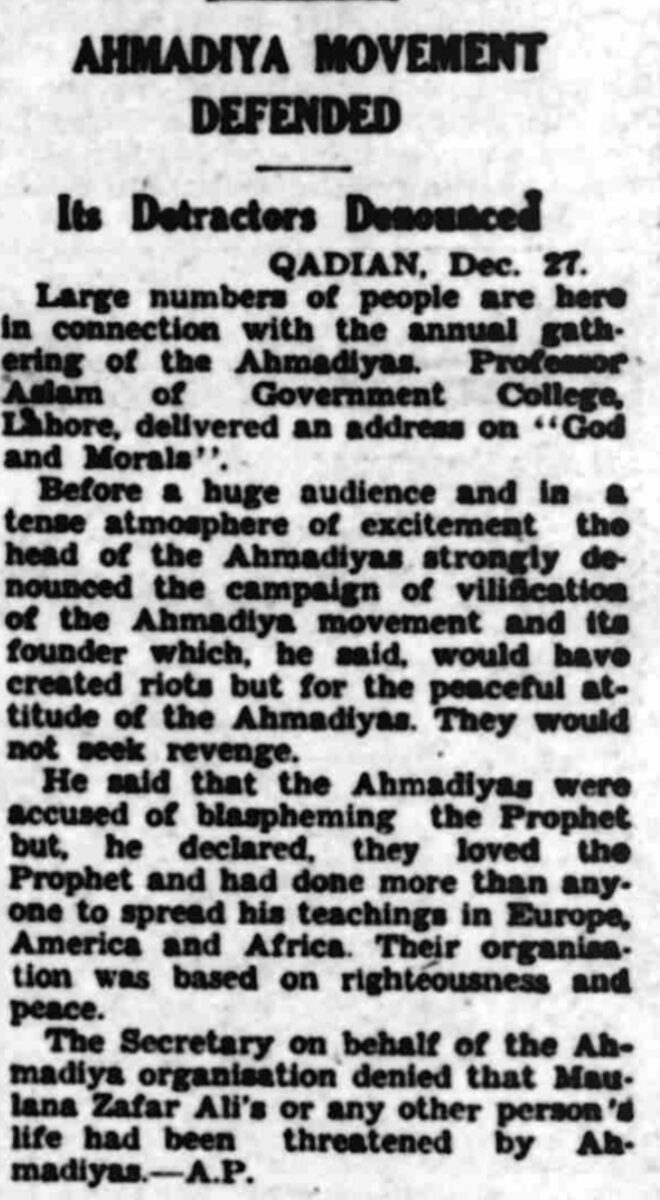
Reporting on the proceedings of the third day, the same newspapers wrote under the heading “Economic Ideals of Islam: Ch. Zafrullah Khan’s Address at Qadian”:
“Qadian, Dec. 28.
“Some 20,000 people attended the third day’s session of the Ahmadiya Conference, a feature of which was a striking address by Chaudhri Zafrullah Khan on ‘Socialism and the economic ideals of Islam.’
“He criticised Mr. Gandhi’s views on small industries and surveyed the arguments for and against the capitalistic and socialistic systems of society and said:
“‘Islam effects a rapprochement between the two by its teachings. The Islamic law of inheritance. Its prohibitory injunctions against all interest, strikes and lock-outs, its creation of arbitration courts to decide labour and capital disputes, its institution of legal alms and provision against natural calamities created a form of society which met all human and economic needs.’
“Another interesting address was given by a former Ahmadiya missionary in West Africa, who described the conditions of life there and the civilising effect of Islam.
“In his speech today, the Head of the Ahmadiyas referred to the great moral and spiritual awakening effected by the Founder of the Ahmadiya movement. The object of the Founders’ mission was to promote amicable relations among various communities, establish religion on a firm basis, raise the suppressed communities, bring about a union between East and West and gather all nations under Islam’s banner.
“A women’s conference was held separately. A.P.” (The Civil and Military Gazette, 29 December 1934, p. 5)
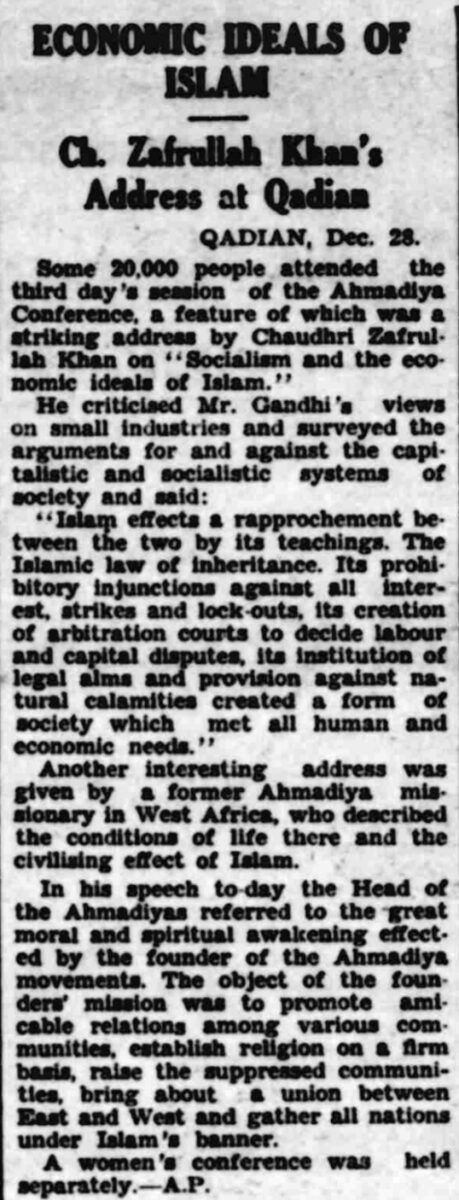
Jalsa Salana 1935
Announcing the dates of the Jalsa Salana Qadian 1935, the same newspaper wrote:
“The annual gathering of the Ahmadiyya community will be held at Qadian, Punjab from December 25 to 27—A.P.” (The Civil and Military Gazette, 20 December 1935, p. 8)

Jalsa Salana 1936
Mentioning the Jalsa Salana Qadian 1936, the same newspaper wrote under the heading “The Ahmadiya Community: Leader’s Survey of Progress—Address to 20,000 Pilgrims”:
“Qadian, Dec. 28.
“Addressing about 20,000 pilgrims today, the head of the Ahmadiya community surveyed the progress made by the community in all walks of life and then passed on to the industrial ventures. such as carpentry, iron-smithy and boot making, started locally under the auspices of the new schemes department, which, he said, was receiving his personal attention.
“He told his followers that the avenues of Government employment had closed and that they should take to professions. Unemployment was a vicious circle and the sooner it was ironed out the better. He wanted to see no Ahmadi youth gad about. He called upon youths to work.
“He dwelt upon items in the new scheme, with special reference to the trust fund, which, if it amounted to five or six lakhs, he said, would confer upon the community the blessings of economic self-sufficiency.
“He said that there would be no doles or alms, except to complete cripples, Poor men and women, who were able-bodied would have to work. He exhorted his followers to learn the dignity of labour, and said that he was determined to wear homespun cloth to encourage cotton weaving. He advised his audience to build houses in Qadian.
“The address concluded at 6 p.m.
“Ahmadiya Ideals
“Chaudhri Sir Mohd. Zafrullah Khan[ra] addressed a gathering of youths under the auspices of the Ahmadiya Fellowship of Youth. His subject was ‘The Ideals of Ahmadiya young men.’ He told his listeners that the ideal was contained in ‘Kalima.’ They must have an unalloyed belief in God and follow the Holy Prophet[sa]. They must cultivate the qualities of courage, self-sacrifice, truthfulness and self-reliance.
“He stressed the importance of physical culture, as sound and healthy bodies, he said, strengthened human virtues and made life worth living. Islamic virtues, he continued, had been given a new lease of life after the advent of the Prophet Ahmad[as] of Qadian. He advised his listeners to emulate their spiritual forefathers and to offer unquestioned obedience to the leader. His lecture lasted 90 minutes.—A.P.” (The Civil and Military Gazette, 30 December 1936, p. 5)

Jalsa Salana 1937
Mentioning the Jalsa Salana Qadian 1937, the same newspaper reported under the heading “Ahmadiyya Conference: 46th Annual Session Opens at Qadian—History of Movement Outlined”:
“Qadian, Dec. 27.
“With a stirring appeal to the audience to have confidence in the latent powers and wonderful capacities with which human nature was imbued and to trust in God, who was the giver of these powers, Mirza Bashir-ud-Din Mahmud Ahmad[ra], head of the Ahmadiyya community, opened the 46th annual session of the Ahrnadiyya Conference on Sunday morning in the presence of a very large gathering.
“The session will continue for three days in the course of which the head of the community will deliver two addresses, the first of which comprises a review of last year’s work of the community, missionary and otherwise, and the programme for the coming year.
“The subject of the second address will be literary. Fifteen more lectures will be delivered. Prominent among the lectures are Sir Zafrulla Khan[ra], Commerce Member, Government of India; Qazi Mohd Aslam, Professor, Government College, Lahore; Dr. Mufti Mohd. Sadiq[ra], a former missionary in England and America; Mr. Abdur Rahim Dard[ra], a former missionary in England and Africa, and Maulvi Abul-Ata[ra], a missionary in Palestine and the Near East.
“After recitation from the Quran, the head of the Ahmadiyya community, in the course of his inaugural address, briefly discussed the rise and fall of nations. Sacrifices and sufferings, he said, make a nation great. United front of opponents and sundry other trials and tribulations only go to tone up the validity and moral calibre of a living community, which has a grand mission before it.
“He recalled the humble origin of the annual gathering and its growth into an institution, attracting people from all quarters of the world. The cosmopolitan character of the audience bore testimony to its increasing popularity.
“He exhorted his followers to have unfailing faith in the truth of their mission and let no spirit of defeatism mar their determination.
“The service of humanity, he said, was the great purpose of man’s life, which made it worth living.
“Sir Zafrullah Khan[ra], in the course of his speech on ‘the responsibilities of Ahmadiyya youth,’ exhorted young Ahmadis to train and equip themselves, intellectually and physically, for the battle of life, firstly, by fully understanding what their movement stood for and, secondly, by living clean lives.
“‘Truthfulness, uprightness, punctuality, respect for law and authority, faithfulness to one’s obligations and above all, the realisation of the importance of time,’ he said, ‘are some of the qualities badly in need of being cultivated by our young men. Time is God’s most precious gift to man, more precious than air and light. It is the breath of life and should not, therefore, be wasted lightheartedly.’
“The Ahmadiyyas are a sect among Muslims whose distinctive feature is their missionary organisations in many countries. The head office is at Qadian and the head of the organisation is called Khalifa (successor to the Founder of the Ahmadiyya Movement) corresponding to the Khalifas of the Prophet Muhammad[sa], whose traditions they claim to have revived.
“The Ahmadiyyas claim to have a following of over 1,000,000, which they believe is quickly increasing as a result of their missionary activities bringing converts into their movement from every religion and from every country.
“Mostly living in India, the birth-place of the movement, the Ahmadiyyas claim to have co-religionists among the inhabitants of all Islamic countries, such as Afghanistan, Persia, Arabia, Syria, Palestine, Egypt and Turkey. Penetrating Europe, they have opened regular missions in Russia, Germany, Poland, Yugoslavia, Hungary and Spain.
“The centre of the movement in England is a mosque in London built at a cost of £5,000. The foundation-stone of this mosque was laid by the present head of the community, Mirza Bashir-ud-Din Mahmud Ahmad, in 1924, when he visited England in connection with the World Religious Conference. Besides this, the Ahmadiyyas have missions, schools and mosques in North and South America and Nigeria, Kenya, Tanganyika and many other places in Africa. In the East they have established missions at Sumatra, Java, the Straits Settlements, China and Japan.
“The annual conference, of which the present is the 46th session, was inaugurated by His Holiness Mirza Ghulam Ahmad[as] in 1891 and since then it has been held every year in Christmas Week, the only interruptions having been in 1893 and 1900.
“Started on a small scale, the conference has become very popular and every year, about 25,000 pilgrims go to Qadian from all parts of India, and abroad. Qadian, which is otherwise a small village with a population of 9,000, during the conference wears the appearance of town en jete, with tents, stalls and animal and industrial exhibitions. In view of the crowds which gathered every year during Christmas and—though on a smaller scale—during Easter, the railway authorities brought Qadian within the range of rail communication in 1928 by connecting it to Batala, 13 miles away.
“A separate, three-day conference for women is held in pardah. The gathering is generally well over 3,000.” (The Civil and Military Gazette, 28 December 1937, p. 5)
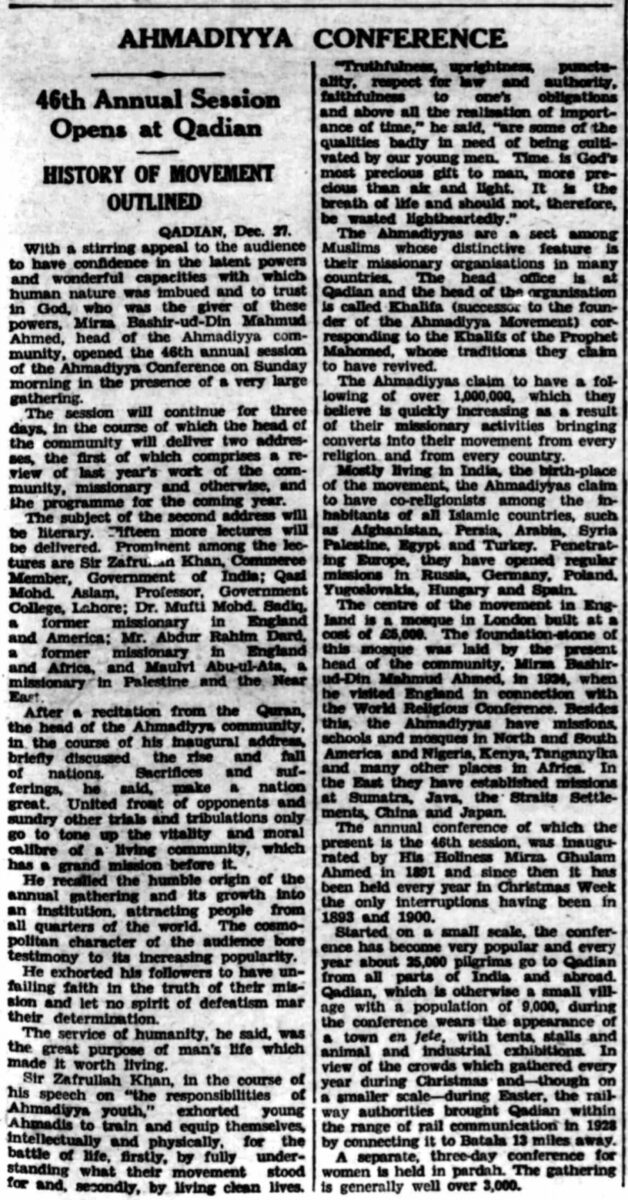
Jalsa Salana 1938
Reporting on the Jalsa Salana Qadian 1938, the same newspaper wrote under the heading “Annual Gathering of Ahmadiyas: Thousands Meet at Qadian”:
“Qadian, Dec. 27.
“The annual gathering of the community began today. Thousands of Ahmadiyas from all parts of India and some from foreign countries have fore-gathered at Qadian to pay homage to and seek guidance from their leader, Hazrat Mirza Bashir-ud-Din Mahmud Ahmad[ra]. All these thousands, including a fairly large number of non-Ahmadiyas and non-Muslims, are being entertained as guests, the Central Organisation of the community attending to their comfort and board and lodging.
“The Lajna Imaillah (the Society for Women), is looking after the women visitors and a separate women’s conference is being held under its auspices today.
“The conference opened in a spacious pandal built to accommodate several thousands. Among those seated on the dais were Sir Mohamed Zafrullah Khan[ra], Nawab Mohammad Din, the Revenue Member of Jodhpur, Seth Abdullah Allahdin, Maulana Sher Ali[ra] and Mirza Bashir Ahmad[ra].
“In the course of his inaugural address, the head of the community referred to the uniform success that had attended their activities despite opposition. No power on earth, he said, could stem the tide of the onward march of the Ahmadiya community, which was destined to create a new order of things. They were determined to establish God’s Kingdom on earth.
“In the afternoon, the leader, in a stirring speech before the Khuddamul Ahmadiyat (the Servants of the Ahmadiyat Society), exhorted his young followers to be true, honest, punctual, persevering, brave and humble. He explained to them the value of discipline and unquestioning obedience to the orders of their leaders.

“‘Let service to humanity be your Ideal,’ he added, ‘for there is no ideal nobler than this.’
“Professor Muhammad Aslam spoke on the unity of Godhood. The oneness of Godhood, he said, pre-supposed the oneness of humanity and this was why Islam laid down the basis of a vast brotherhood in which social status, lineage and pedigree did not count and in which service was the hallmark of respectability.
“Messrs. Muhammad Sadiq[ra], F. M. Sial[ra], M. Y. Arif and A. R. Dard[ra], all former Ahmadiya missionaries in England, delivered speeches, the last mentioned ‘My Impressions about the progress of Islam in England.’ His stay of six years in England, he said, had convinced him of the very bright future for Islam in that country. A drift towards ideals and principles more akin to those of Islam than any other religious system was visible.
“A distinctive feature of this year’s conference is that, of the 14 speakers, 12 have been to England, America, West Africa. Palestine, Syria and Egypt as Ahmadiya missionaries—A.P.” (The Civil and Military Gazette, 28 December 1938, p. 16)
Golden Jubilee Jalsa 1939
Mentioning the Golden Jubilee Jalsa of 1939, the same newspaper wrote under the heading “Golden Jubilee of Ahmadiya Movement: Qadian Celebrations”:
“The golden jubilee of the Ahmadiya movement and the silver jubilee of its head, Khalifa Mirza Bashir-ud-Din Mahmud Ahmad[ra], will be celebrated at Qadian during the next few days.
“A spacious pandal has been constructed and volunteers are working to ensure comfort for thousands of Ahmadiyas who are coming from all parts of India and foreign countries. Simultaneously a women’s conference will be held.
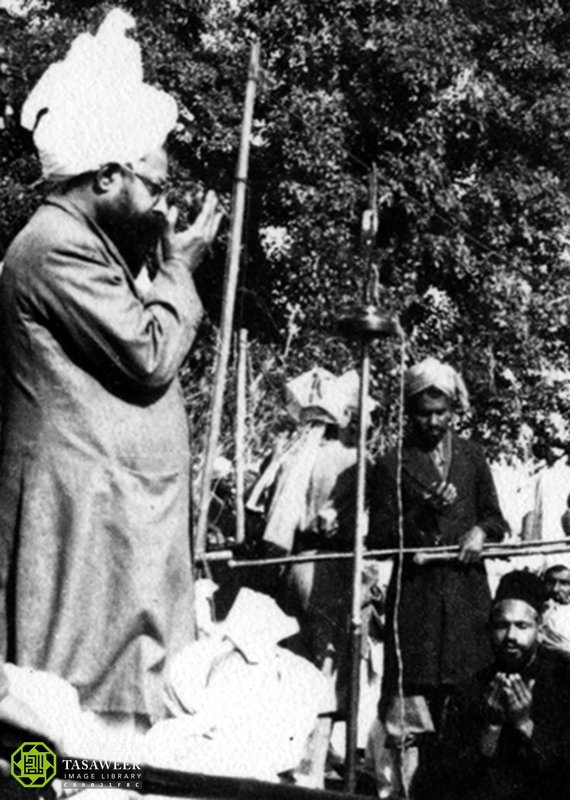
“At 10-45 this morning amidst the shouts of community slogans the head of the Ahmadiyas entered the pandal and declared the conference open. He referred to the progress made by the community during the past 25 years and particularly mentioned the work of the missionaries in Foreign countries. He said that through the combined and collective efforts of the Ahmadiyas Islam would advance to its destined and promised goal of bringing about a new and better social order on the ashes of the present corrupt and decadent system.
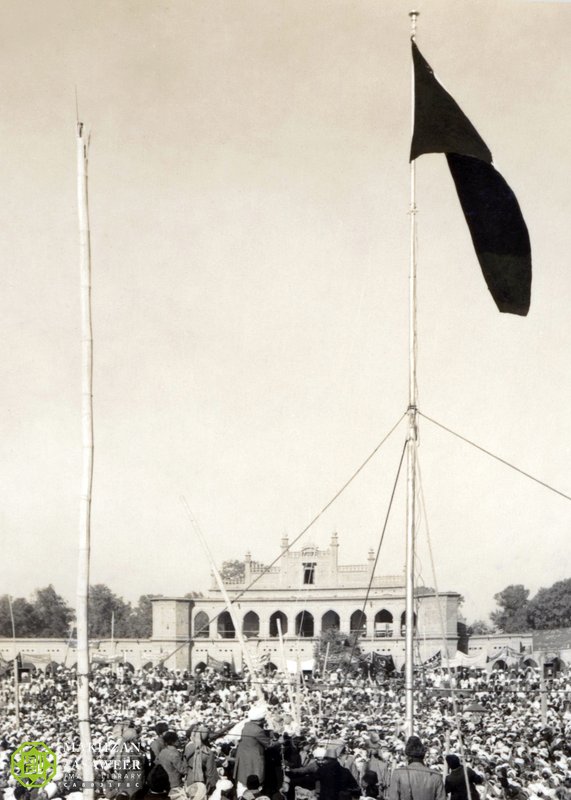
“Among those present today were Sir Muhammad Zafrullah Khan, Nawab Mohammad Din, and Nawab Akbar Yar Jung Bahadur.—A.P.” (The Civil and Military Gazette, 28 December 1939, p. 3)
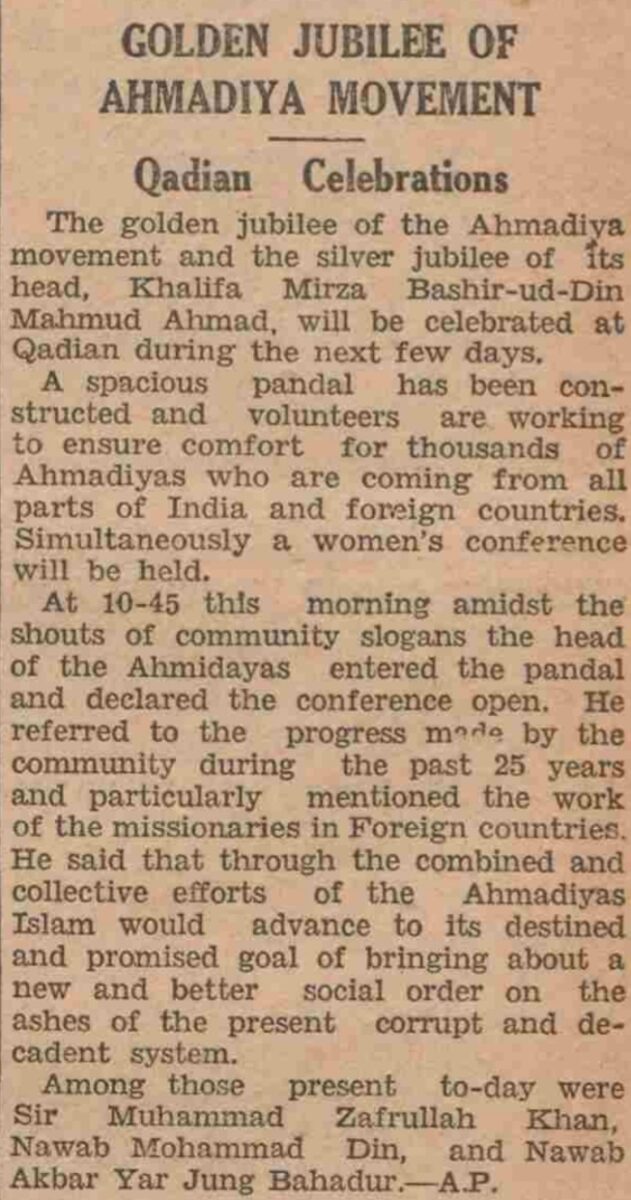
The Dundee Evening Telegraph wrote under the heading “Indian Leader Urges Support for Britain”:
“Unqualified and unstinted support of Britain in the prosecution of the war was urged today by Mr Mirza Bashir[-ud-Din Mahmud] Ahmed, head of the Ahmadiya community.
“He was speaking at a conference at Quadian, at which the golden jubilee of the Ahmadiya movement was being celebrated.
“Mr Mirza Bashir Ahmed” criticised “‘the foolish notion that England’s difficulty was India’s opportunity.’” (Dundee Evening Telegraph, 29 December 1939, p. 1)
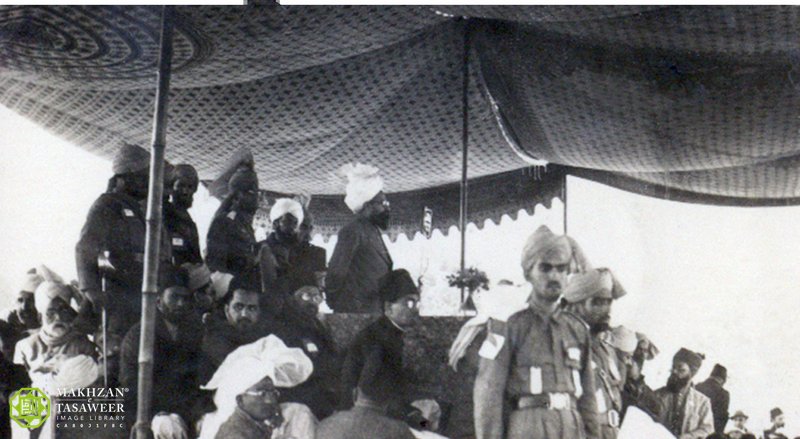
The same news was published by Coventry Evening Telegraph, Derby Daily Telegraph, Nottingham Journal, Sunderland Daily Echo and Shipping Gazette, Newcastle Evening Chronicle, Hartlepool Northern Daily Mail, Grimsby Daily Telegraph, Belfast Telegraph, Leicester Daily Mercury, Bristol Evening Post, Leicester Evening Mail, Shields Daily News, Halifax Evening Courier, Scunthorpe Evening Telegraph, Liverpool Evening Express, Belfast News-Letter, Huddersfield Daily Examiner, and Torbay Express and South Devon Echo.
The Civil and Military Gazette reported under the heading “Dictatorship and Khilafat: Sir M. Zafrullah Khan Explains Difference”:
“‘Difference between dictatorship and Islamic Khilafat’ was the subject of an interesting lecture delivered by Chowdhuri Sir M. Zafrullah Khan at the open session of the Ahmadiyya annual gathering at Qadian on Wednesday.
“Addressing the gathering, he said that it should be borne in mind that being a synthesis of all constitutions, incorporating in itself all that was good in them, Islamic Khilafat neither resembled any of them nor was adequately describable by constitutional terms commonly understood. The essential and fundamental difference between dictatorship and Khilafat was that whereas a dictator was law unto himself, an Islamic Khalifa was bound by Islamic law and could not change or override it. All powers and resources of an Islamic Khalifa were devoted to the achievement of ideals, fixed by Islamic Shariyyat but a dictator’s ideals were of his own conception.
“On Tuesday night, Maulvi Ata-ur-Rahman, Director of Public Instructions, Assam, delivered a lecture on the spirit of Ahmadiyat. Sir Mohd. Zafrullah Khan was in the Chair. He said that the Ahmadiyya movement was neither a system of religion nor a code of ethics, but the new orientation of life for Muslims in the present time. He added that the revivalism symbolised by the Ahmadiyya movement was not man-made but divinely inspired.—A.P.” (The Civil and Military Gazette, 29 December 1939, p. 4)
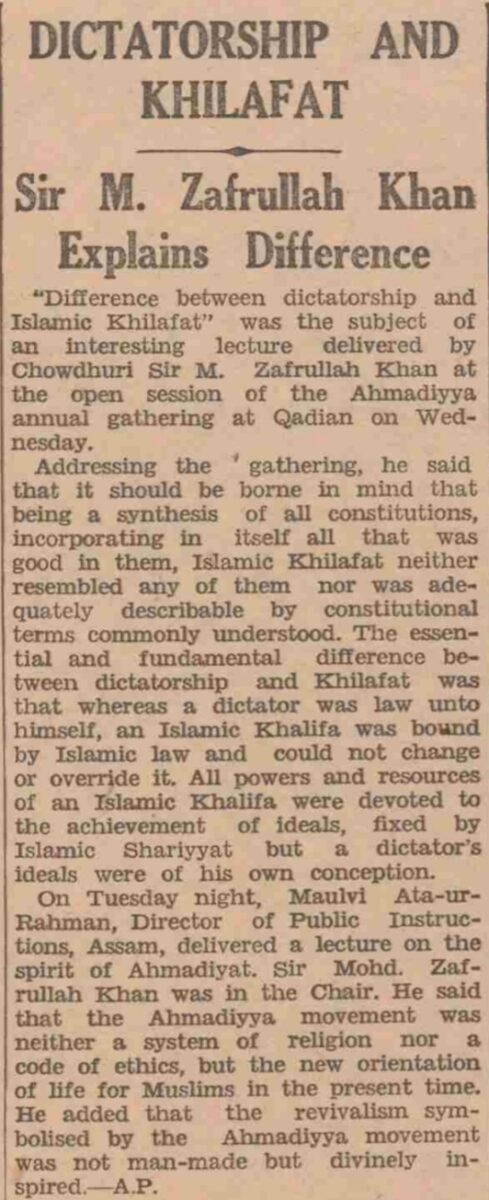
Jalsa Salana 1941
Reporting on the Jalsa Salana 1941, the same newspaper reported under the heading “Enemy Knocking at India’s Door”:
“Qadian, Dec. 27.
“A call to the Ahmediyya community to offer their wholehearted cooperation in the prosecution of the war was made by Mirza Bashir-ud-Din Mahmood Ahmad[ra], the Head of the Ahmadiyya community, addressing the Ahmadiyya Annual Conference today.
“‘These are very critical times,’ said Mirza Bashir-ud-Din; ‘war is knocking at India’s door. Events have taken a very serious turn. The enemy is powerful and India is almost unarmed. The impact of war may unhinge the whole life of the country. Dangerous days are ahead and our duty is clear. [Indian people’s] destinies seem to be inseparably linked with the British Government. We should give our wholehearted cooperation in the war effort.’
“He deplored the lack of spirit in the people to face the impending menace, which, he said, was due to the benevolent indifference of the Government to the genuine needs of India’s defence.
“‘Speaking on ‘Our duties in the Present World Crisis,’ Sir Muhammad Zafrulla Khan said that, long before the present conflagration, the like of which man had not witnessed before, overtook the world, political thinkers and those gifted with spiritual insight to foresee and foretell coming events, had perceived that the West was heading towards a catastrophe. Western political, social and economic systems, having outlived their usefulness, were destined to die.
“The old order, he added, had gone never to return and on its ashes and out of humanity’s pains and affliction would emerge a new order very different and vastly superior to the present one.
“God in his all-pervading wisdom, continued Sir Muhammad, had decreed that, being eminently fitted on account of its vast area and being the homeland of many faiths and cultures and peoples, India should play a leading role in building the new order.
“Sir Muhammad exhorted the audience to be watchful and ready to contribute their share to the building of that order lest when the appointed hour came, they should be found wanting.
“Young men of courage, vision and conscience were needed. They help create a new and better state of things by selfless service, suffering, and sacrifice and by living up to those noble principles and ideals on which, as envisaged by Islam and the Ahmadiyya movement, future order would be broadbased.—A.P.” (The Civil and Military Gazette, 30 December 1941, p. 6)

Jalsa Salana 1944
Mentioning the Jalsa Salana 1944, the same newspaper reported under the heading “Future of England and India”:
“The future of England and India is inseparably linked for a long time to come, and the one cannot do without the other.
“‘Let India forget her vendetta against England and England shed her imperialism in India,’ declared Mirza Bashiruddin Mahmud Ahmad[ra], head of the Ahmadiyya community, addressing the annual meeting of the community at Qadian on Thursday.
“‘If England and India do not come to terms,’ he added, ‘both will go under, because much greater issues are at stake than either the freedom of India or England’s imperialist interests.
“‘The Teheran Conference should open one’s eyes to the dangers ahead.’
“He also strongly advised Hindus, Muslims and Sikhs to learn to live like brothers, because their quarrels are a mere storm in a tea-cup in comparison with the international storm that is brewing and threatens to engulf the whole of mankind.
“The Mirza Sahib further said:
“‘I have no love for the Unionist Party or the Punjab Muslim League, because both are opportunist.
“‘Ahmadi Government officials should have nothing to do with either of them.
“‘The one party has no real politics—the other has bad politics.
“‘But I offer from this platform,’ he said, ‘full and unqualified cooperation and support to effect peace between Muslims and non-Muslims and between India and England, because I am a man of peace and also because the critical times ahead demand it.’
“The Mirza Sahib then briefly surveyed the activities of the Ahmadiyya community in the past year and sketched a programme for missionary expansion, economic uplift, and educational progress of the community.
“‘Next year,’ he said, ‘the Holy Quran will be translated into seven European languages and Ahmadiyya mosques will be built in all the provincial capitals in India.’—A.P.” (The Civil and Military Gazette, 29 December 1944, p. 7)

Jalsa Salana 1946
Announcing the Jalsa Salana Qadian 1946 — the last Jalsa Salana Qadian which was graced with the presence of Hazrat Khalifatul Masih IIra — the same newspaper wrote under the heading “Ahmadiyya Conference”:
“The annual Ahmadiyya Conference at Qadian will be held from December 26 to 28. The head of the Ahmadiyya community [Hazrat Mirza Bashir-ud-Din Mahmud Ahmadra], Sir Zafrullah Khan, and Maulana J. D. Shams, former Imam of the London Mosque, among others, will attend the conference.” (The Civil and Military Gazette, 24 December 1946, p. 15)
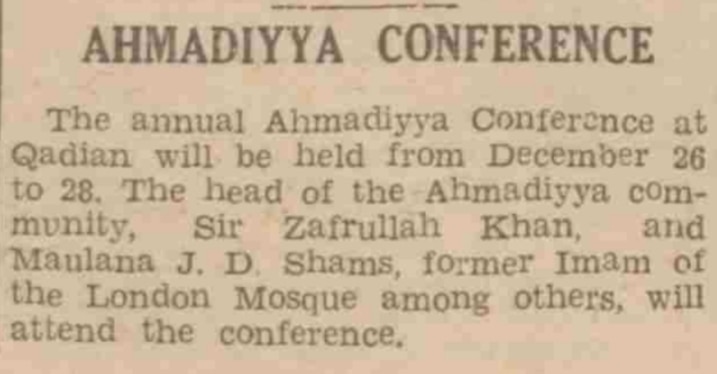
Mentioning the Jalsa proceedings, the same newspaper reported under the heading “Annual General Meeting of Ahmadiyyas: Qadiani Head’s Message”:
“Qadian, Dec. 27.—The Annual General Meeting of the Anjuman-e-Ahmadiyya, Qadian, opened at Qadian yesterday with a short address by the head of the Ahmadiyya community.
“‘Human inventions made for progress and prosperity are turning to destruction but man must survive to fulfil the work of God that Islam shall prevail supreme over the world to give peace and prosperity to suffering humanity.’
“This was the message of hope given by the head of the Ahmadiyya community.
“Proceedings will continue for three days.
“Among other Speakers will be Maulvi Shamas, back after 10 years missionary work in London; Sir Mohammad Zafarullah Khan, and many scholars and missionaries.” (The Civil and Military Gazette, 28 December 1946, p. 5)
